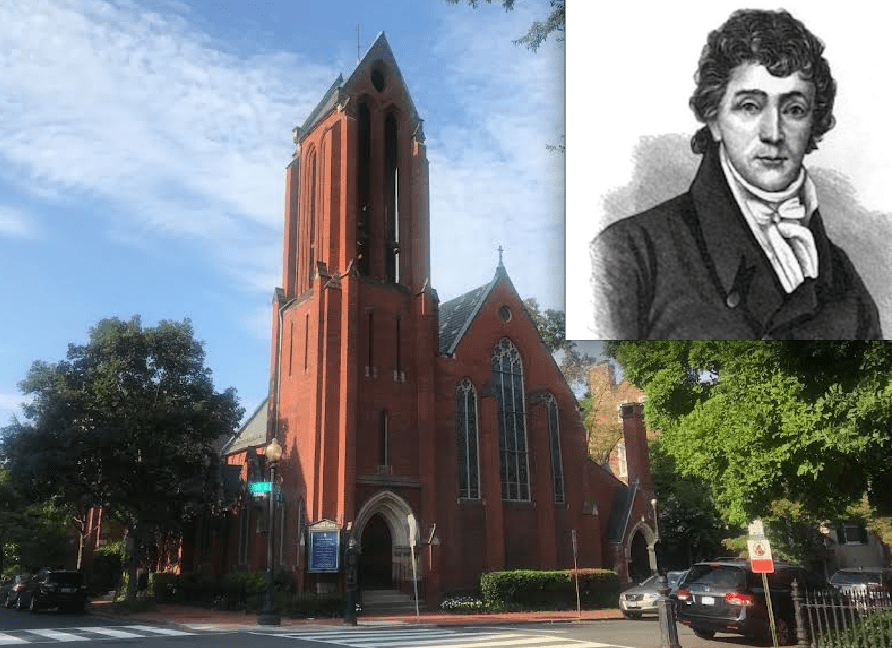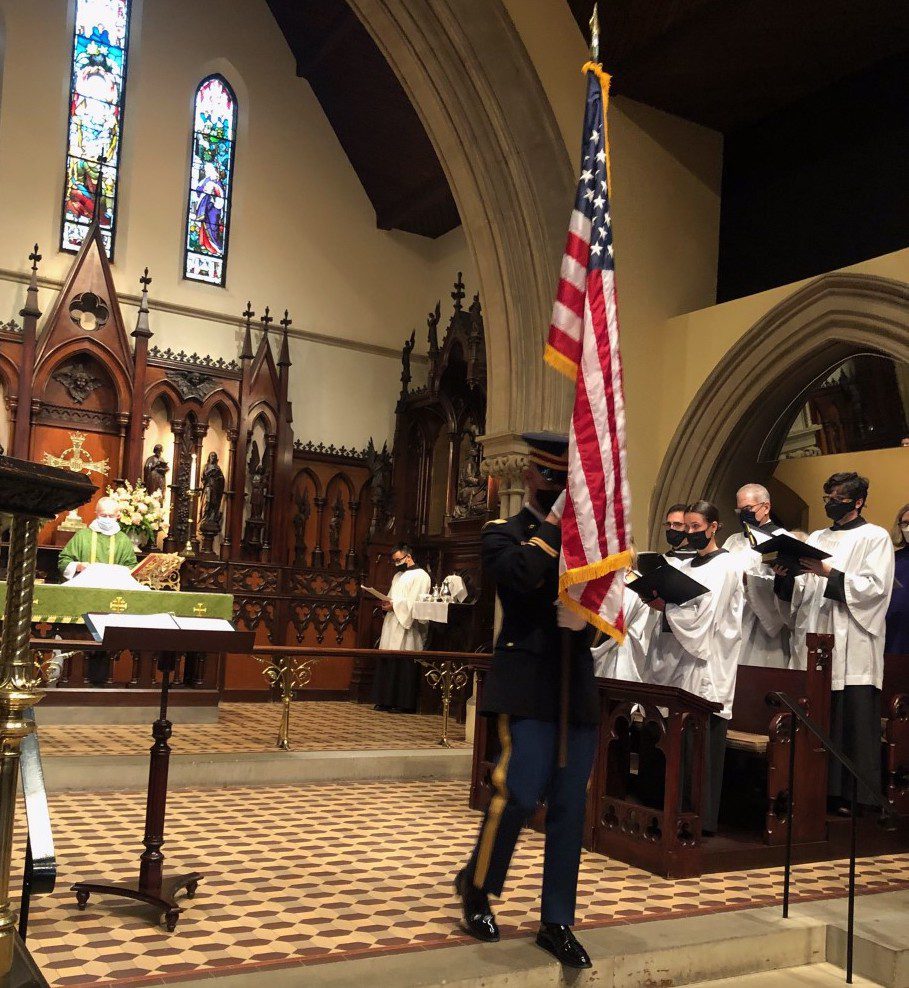Christ Church Celebrates Key’s Birthday; Plans Sept. 12 Homecoming
By • August 6, 2021 One Comment 1247

The congregation of Christ Church Georgetown gathered Aug. 1 to celebrate the birthday of one of its founders, Frances Scott Key (1779-1843), author of “The Star-Spangled Banner,” who lived on M Street near 36th Street when he wrote it in 1814.
The Sunday service with its military flourishes included the attendance of British Ambassador Karen Pierce and the singing of the national anthem — first stanza (the one only usually sung) and the triumphant fourth stanza. Also in the pews were members of the Daughters of the American Revolution and the Society of the War of 1812 in the District of Columbia as well as alumni from Key’s alma mater, St. John’s College in Annapolis.
Asked by President Madison’s White House to help gain release of a prisoner of the British, Key was detained because the Royal Navy was set to bombard Fort McHenry in Baltimore. His witness to history made history and our enduring national song. Today, Key is also remembered with his own park and bridge in Georgetown.
While acknowledging the current criticism of the man, Christ Church Rector, the Reverend Timothy Cole, offered a resounding and insightful meditation upon Key, a figure of his time, while working in the powerful lessons of scripture.
Portions of the Aug. 1 homily by Cole — who served as a chaplain in the British military — follow. (It is available in its entirety at christchurchgeorgetown.org/sermons.)
“We commemorate the birthday of our most famous founder, Frances Scott Key, in this the 90th year since his renowned poem was adopted by Congress as the national anthem of the country.
“Now, I am sure that the irony of someone with an accent like mine, should be speaking to you on this morning on this subject is not lost on any of us. I can only say that, while I would like to draw a discreet veil over the somewhat unruly behavior of my ancestors at Bladensburg, Washington and at the bombardment of Fort McHenry, we can say that that unfortunate business did inspire one of the most stirring and remarkable national anthems the world has ever seen, and our histories since then, are also, I hope, witness to the truth that once implacable enemies can indeed become our fastest friends. So, I would beg your indulgence for these few reflections of one who has served alongside American soldiers in far flung places and become truly very fond of this country and its remarkable people.
“… Today we celebrate the birthday of our founder, Frances Scott Key. Like almost all the 18th and 19th century founders of this country, he is currently a controversial figure. If you want to know more about him, in these highly charged and partisan days, I would just urge you to look beyond the superficial content that a few Google searches throw up, and look to more serious and balanced historical assessments.
“One of our own historians, Tom Crocker did some excellent work on Key for our Bicentennial, and Jefferson Morley gives, I think, a balanced account in his book ‘Snow-Storm in August.’ Like our own lives, Key’s life is not simple picture.
“Key was a deeply religious man who seriously considered taking Holy Orders and who was instrumental, not just in the founding of this Church, but also of Virginia Theological Seminary. …
“Key and his wife Mary Lloyd, had 11 children. As Tom Crocker writes “Of these, four met untimely deaths. Edward drowned in Potomac River at Georgetown at age nine (his funeral was held at Christ Church on July 10, 1822). Daniel Murray was killed in a duel as young naval officer in 1836. John Ross, a promising young lawyer in the family tradition, died of a sudden illness less than a year later. Philip Barton, like his father, the U.S. District Attorney for the District of Columbia, was shot and killed in Lafayette Park at the corner of Madison Place and Pennsylvania Avenue by Congressman Daniel E. Sickles in 1859, because of a love affair he was having with Sickle’s attractive wife. The affair and subsequent murder were one of the great scandals of the age. Sickles was acquitted on the grounds of temporary insanity, the first ever successful pleading of that defense.” Husbands have been using that defense with their wives for more trivial offenses ever since of course, but mostly, it has to be said, with less success than Sickles!
“These terrible losses, just go to show how Key and his wife had some deep sorrows and crosses to bear, alongside his considerable fame as the writer of ‘The Star-Spangled Banner’ and his success as a lawyer. Success that included his appointment as the United States Attorney for D.C., thanks to his relationship with President Jackson, for whom he acted as a private emissary on more than one occasion.
“Like so many figures in the history of 18th and 19th century America, Key grew up in a world where slavery was an ugly, but then sadly normal, part of the fabric of the society of his day. Key was a humanitarian and a Christian and struggled in his relationship with slavery. As U.S. Attorney for the District of Columbia, that is, as a state prosecutor, he had no choice but to enforce the laws as they existed at the time. However, when in private practice, he also represented slaves pro bono and won cases for them. Jefferson Morley says that some even called him ‘the Blacks’ Lawyer.’ He favored ‘colonization’ and actively sought to free slaves and to help them to emigrate to Liberia. He took part in the freeing of some 200 slaves over his years as a lawyer, but the sending of them back to Africa seems a hopelessly condescending approach to us today, and one which undoubtedly viewed people of color as inferior and mostly unable to cope with freedom in America. In this, Frances Scott Key showed himself to be flawed and a man of his time. The challenge to us today, is whether, if we are able to imagine ourselves in the shoes of people like him, can we be confident that we would have behaved any better or, given the society we would have been brought up in, whether we would have thought very differently. In his day, there were some who did, but would you and I?
“Jesus said ‘By their fruits ye shall know them.’ Today, we celebrate Frances Scott Key’s birthday and we celebrate the good fruit of his life, faith and labors. This Church, which has been a lamp of Christ’s light in Georgetown for 200 years, the Virginia Theological Seminary, that has produced clergy for the Episcopal Church for a similar period of time and the national anthem, which, even though I am not an American, I still find one of the most moving and powerful songs I know.
“Though I can’t resist reminding you that the tune is, in fact, a British drinking song from a club named after the Greek poet Anacreon whose poetry celebrated wine, women and entertaining! That’s why it is such a great tune!
“Today there is controversy about this anthem too, of course. There is debate about the third verse in which some believe the words ‘the hireling and slave’ are a snide reference to the freed Blacks who were fighting for the British, while others think it refers to the British soldiers themselves, who as agents, of the Tyrant George III, (named so in the Declaration of Independence) represented the servitude that the new country America had just freed itself from some 36 or so years earlier. I think you just have to read it for yourself and make up your own mind. As constitutional lawyers and Biblical Scholars know, authorial intention is often very hard to be certain about.
“ ‘The Star-Spangled Banner’ was an immediate hit and made Key famous in his own lifetime. I think we can all see why it was so popular. It has real and vivid drama with “the rocket’s red glare, the bombs bursting in air.” It captured the defiance and victory that the newly independent country felt at having successfully freed itself from, and resisted the armies of the most powerful country in the world at the time. …
“To love your country, to aspire to a home and a society, that deserves and demands the love and service of its people, is a good thing. But it is not best thing. No human society or nation can avoid the brokenness and sinfulness of the world. Frances Scott Key could not, and neither can you and I. The most we can ever hope for is that in our love, service and sacrifice we might do better than we have done.
“But that is not the best thing, the best thing, is that we might be held and sustained and supported and fed in a body with a head who knows the way to life. That is best, because what we aspire to be does not just depend on us. We cannot redeem our world or ourselves. Only Christ can.
“God bless this church that Frances Scott Key and others brought into being, God Bless this country and above all our reliance on economic or military or political strength may our motto ever remain, as Key suggests, ‘in God is our trust.’ ”
With plans underway for the full re-opening of the church in the fall, Homecoming Sunday is scheduled for Sept. 12 and the launch of in-person Sunday school on Sept. 19. (Star-Spangled Banner Day is Sept. 14.)

Captain James Rojek, US Army, and Christ Church parishioner, presented the American flag. Courtesy Stephanie Green.


Frances Scott Key was my cousin. His mother and my many great grandmother were sisters. I am so glad that Christ Church celebrated his birthday. An amazing man.